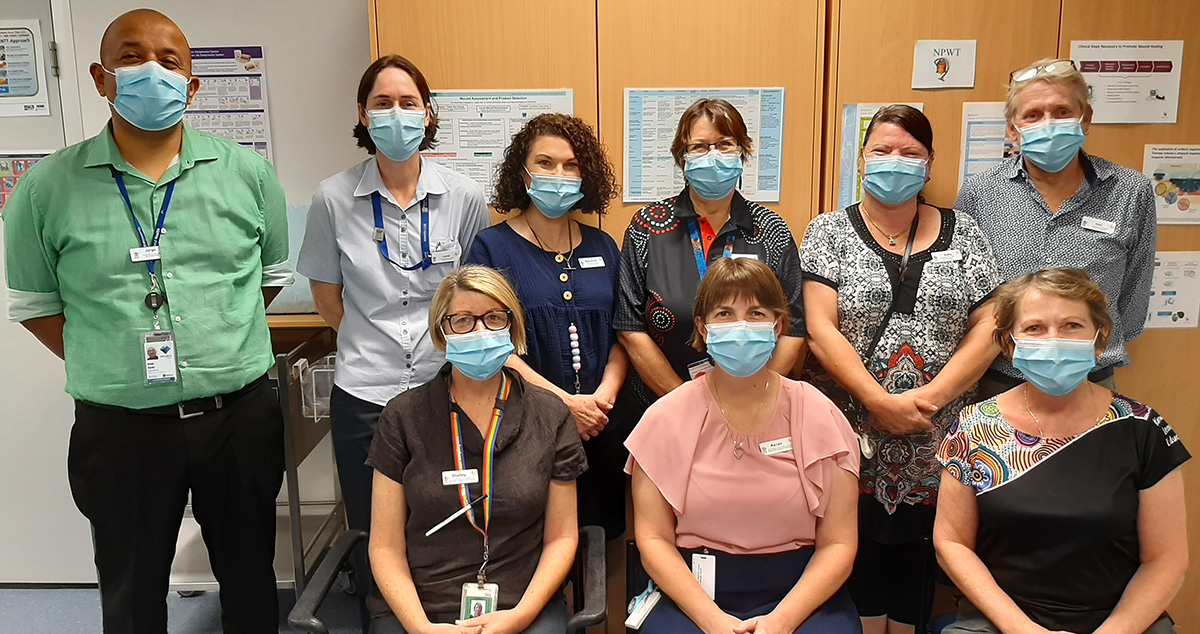Enhanced PACS supports healthcare closer to home
An enhanced community healthcare service is improving the care provided to the elderly, reducing hospital presentations, and ensuring faster adult patient discharges from hospital.
Community and Oral Health Acting Nursing Director Vicky Sinclair said the Post-Acute Care Service (PACS) has introduced a rapid response multi-disciplinary model of care to enhance the care available to the elderly and support healthy aging.
“Demand for care that is accessible and convenient for the elderly in their home or in a community setting is increasing,” Vicky said.
“Community-based healthcare services are an important option for supporting independent living and provide a safe alternative to hospital treatment.”
As part of the innovative new service, Enhanced PACS is supporting the early discharge of elderly patients from hospital or through referrals from GPs by delivering safe assessments and treatments from a multidisciplinary team, with access to a Geriatrician.
“Enhanced PACS provides patients with access to rapid assessments from the multi-disciplinary team within 24 hours of referral” she said.
“If indicated, a geriatrician undertakes medical assessments and interventions, facilitates necessary medical liaison between the nominated GP and other specialists involved in the care of the client.
“Nursing, social work, occupational therapy, pharmacists and physiotherapy provide expert assessment and care to support patients.”
Since the introduction of the new service in March 2022, more than 300 patients have been treated, with many avoiding hospital or safely leaving hospital early, with 89 patients accessing Geriatrician assessments.
“We anticipate that each year the Enhanced PACS service will treat over 1,200 patients,” Vicky said. PACS as a whole service provides care to over 11,800 patients from the age of 18.
The new service is also assessing and addressing complex issues and conditions associated with ageing which can result in deterioration and admission to hospital.
The PACS service provides up to two weeks of care to address the patient’s immediate care needs and coordinate longer-term services as required by the patient.
“Services are being flexibly provided within the home, via telehealth or at local community health clinic to patients who are stable, able to self-care or have a responsible carer,” Vicky said.
PACS will deliver care that better supports people with longer-term complex medical conditions to improve their overall function, wellbeing and independence in the community.
“Key treatments delivered at home or in the community include medication administration and monitoring, catheter care, management of falls risk in the home, chronic disease support, and functional and home assessments,” Vicky said.
“We also provide nutrition support, swallowing assessments, personal care in the home, crisis intervention, carer support and short term acute wound management including stoma care.”
Patients can be referred to the service through a Metro North Health hospital, their GP, Virtual Emergency Department or Queensland Ambulance Service.
Fall provides a silver lining for John
John, who is 67, has had a long history of neurological conditions and has experienced poor balance, falls, double vision and short-term memory loss.
A recent admission to the Post Acute Care Service (PACS) occurred after a fall which involved a head strike and facial lacerations, and a transfer to the emergency department at The Prince Charles Hospital.
Wife Maree Najdek said sometimes you wondered why things happen in life. You can say that someone having a fall is a bad thing.
“John’s fall actually led to us meeting lots of lovely people from PACS and lots of good support being put in place,” she said. “Sometimes things happen for a reason.”
Following discharge, John was referred to Enhanced PACS, and received physiotherapy, social work, pharmacy and geriatrician reviews which led to balance and falls prevention therapies and additional support service options.
Telehealth was used for the geriatrician consultation and after some recommended changes to his medications ongoing support was handed back to John’s General Practitioner.
As a result of the Enhanced PACS interventions John is now attending weekly day therapy for balance improvement. He is now attending day respite twice a week while his wife Maree attends work.
An Aged Care Assessment was conducted and John now has approvals for residential and respite options.

The Post Acute Care Service team (l to r): Jorge Ayala, Leona Maguire, Mary-Anne Bendell, Amanda Cowan, Kathy Radnoty, Alan Fisher, Shelley Theodore, Keren Harvey, Donna Ferguson.
